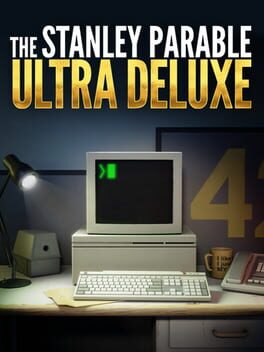It's clear that we've moved on from this. Meta-narratives that make the game "sentient" and talk directly to the player have been a trope of the indie dev scene for a short period of time, under a decade. It was run into the ground mostly because of how popular and ever-present the youtube let's play scene was, and this kind of story was perfect for reaction content with a demographic of teenagers and young adults. None were like Stanley Parable though, for better or for worse.
So when a sequel for a game that criticized the monotony of desk jobs and the false sense of choice we have in our lives was announced, people were pretty skeptical. I mean I wasn't, I had faith, but this could easily be not good. We've moved on, new content doesn't seem as new or exciting as a concept because of this culture we left behind. But oh did they know. They knew exactly what we were doing.
The idea of sequels has been severely tainted by American entertainment. They are cash-grabs, sell-outs, rehashes, and they only serve the purpose to milk as much money out of a successful franchise as possible. The cynical fuckers over at Crows Crows Crows introduce you to "new content" with a door that says "new content", until later when it says "new, new content" with a flashy neon sign. Through constant convoluted mechanics that don't do anything, and long one-sided conversations with the narrator, you get more of the different same. The pressure of pleasing everyone around you, the weight of a legacy holding creativity down, the public outcry determining what you make next, and the sad truth that no, this isn't a "good" sequel, all comes together to make me breathe out of my nose a bit and think on how I go about creating. It doesn't matter, really.
So when a sequel for a game that criticized the monotony of desk jobs and the false sense of choice we have in our lives was announced, people were pretty skeptical. I mean I wasn't, I had faith, but this could easily be not good. We've moved on, new content doesn't seem as new or exciting as a concept because of this culture we left behind. But oh did they know. They knew exactly what we were doing.
The idea of sequels has been severely tainted by American entertainment. They are cash-grabs, sell-outs, rehashes, and they only serve the purpose to milk as much money out of a successful franchise as possible. The cynical fuckers over at Crows Crows Crows introduce you to "new content" with a door that says "new content", until later when it says "new, new content" with a flashy neon sign. Through constant convoluted mechanics that don't do anything, and long one-sided conversations with the narrator, you get more of the different same. The pressure of pleasing everyone around you, the weight of a legacy holding creativity down, the public outcry determining what you make next, and the sad truth that no, this isn't a "good" sequel, all comes together to make me breathe out of my nose a bit and think on how I go about creating. It doesn't matter, really.
